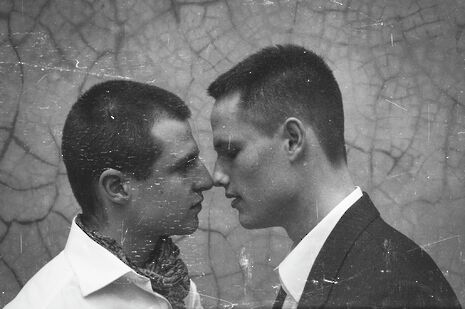The Edinburgh Fringe: spoilt for choice
As many of us look forward to the theatre on offer in the term ahead, Will Leckie looks back on the various experiences of the Edinburgh Fringe Festival, and why he’s bringing it with him to Cambridge.

Content note: this article contains discussion of rape.
This year’s Fringe blew me away from start to finish. I spent almost the full month in Edinburgh, and had the pleasure of seeing some exceptional shows. I also put on my own play for the first time, Bacon, about the dark and troubled love affair of Francis Bacon and George Dyer. Our incredible team, who brought everything together just in time for the seven-day performance, loved almost every minute of it despite ending the run utterly exhausted and having faced two illness-induced cast changes.
Perhaps the greatest pleasure of performing at Edinburgh is being able to see everyone else’s work in such a chaotic, dense setting, alongside your own. The Fringe never sleeps, and you’ve got to be selective about what you see due to the sheer volume and variety on offer. I primarily attended plays, aside from the dazzling Cambridge Cirque du Slay, which warmly welcomed me onstage as a I blared out A Star is Born’s ‘Shallow’ (apologies to any ears that had to hear this). Next year, I think it’s about time I attend with a comedy lover — one able to show me new avenues of the festival!
Choosing a ‘favourite’ moment is almost as difficult as choosing a least favourite. The festival warmly welcomes everyone and hosts all genres, which is what makes it so rich. Yet browsing through the endless programme can lead to attending some far from inspiring shows, like a somewhat nonsensical adaptation of Camus’ Being and Nothingness. I was then exposed to an avant-garde and pretentious imagining of Alan Turing and his romance with a computer in The Heresy Machine. Yet the Fringe is a place where you can afford to stumble (in theory, despite the extortionate and largely unavoidable venue rent). There is no reason why these shows, or the many others that weren’t well received, won’t return again in a new and improved form another year.
“The festival warmly welcomes all shapes and sizes, all genres and experimentations, which is what makes it so rich”
I watched my fair share of more successful and gripping new writing, too. Ceara Dorman’s Unveiled was a moving and thought-provoking play about the Magdalene Laundries; her one-woman piece artfully unpacked the perspectives of different Irish women in these institutions. Gill Mcvey’s A Shadow of Doubt explored dementia in a nuanced and engaging manner, as the audience was taken on a dark and defenceless trip down memory lane. Paper-Mug Theatre’s A Partnership, set in a couple's flat, explored the state of two men’s monogamous relationship and what this word means for the LGBT+ community today. I was also lucky to see the fringe-veteran William Bryan perform on the last night of the festival with Fragility of Man, which told of a lonely journey from boy to manhood rife with rejection, addiction, hope and despair.
Not all the plays I attended dealt in such heavy material however. I attended Coward’s Still Life, a thoroughly entertaining play and. Despite being sceptical of companies bringing classic plays to the fringe (be it an average Hamlet or yet another Woyzeck), I loved seeing Mojo, Butterworth’s dark comedy set in gang-festered Soho. The actors effectively embraced the entirety of their space, utilising scaffolding and empty seats. The company was thematically creative, as compelling gender swaps highlighted an aggressive, underlying misogyny. On a similar note, I was also treated to Connery’s well-paced Hitman and Her, where a woman walks into a bar in order to make her husband disappear, albeit not so quietly.
For me, two pieces undoubtedly stood out from an overwhelmingly huge crowd: Nelson’s Letter to Boddah travelled up from Manchester with a story of two men forgotten by society, who plot to blow up their local Tesco in order to be heard. The chilling dark comedy was utterly captivating.
Cut The Chord’s Endless Second, produced by Cambridge graduate Josh McClure, prevailed as my favourite play. Two aspiring actors meet on day one of drama school and fall passionately in love. This picturesque tale becomes quietly complicated after one drunken evening, as communication corrodes and the pair are forced to unpack the complexities of consent. In this play, rape must be verbalised and confronted head-on. As I left the theatre, still semi-hysterically sobbing, it became even clearer how important the subject matter was.
This month was busy. Very busy. It extended, and in some ways, still hasn’t ended. I left the Fringe like so many: inspired, and ever-so excited for next year. I’m confident that most of the above shows have immensely successful futures ahead of them and look forward to seeing what forms emerge in the many years to come.
 News / Eight Cambridge researchers awarded €17m in ERC research grants27 December 2025
News / Eight Cambridge researchers awarded €17m in ERC research grants27 December 2025 News / Downing investigates ‘mysterious’ underground burial vault 29 December 2025
News / Downing investigates ‘mysterious’ underground burial vault 29 December 2025 Lifestyle / Ask Auntie Alice29 December 2025
Lifestyle / Ask Auntie Alice29 December 2025 Sport / Hard work, heartbreak and hope: international gymnast Maddie Marshall’s journey 29 December 2025
Sport / Hard work, heartbreak and hope: international gymnast Maddie Marshall’s journey 29 December 2025 Interviews / Meet Juan Michel, Cambridge’s multilingual musician29 December 2025
Interviews / Meet Juan Michel, Cambridge’s multilingual musician29 December 2025










